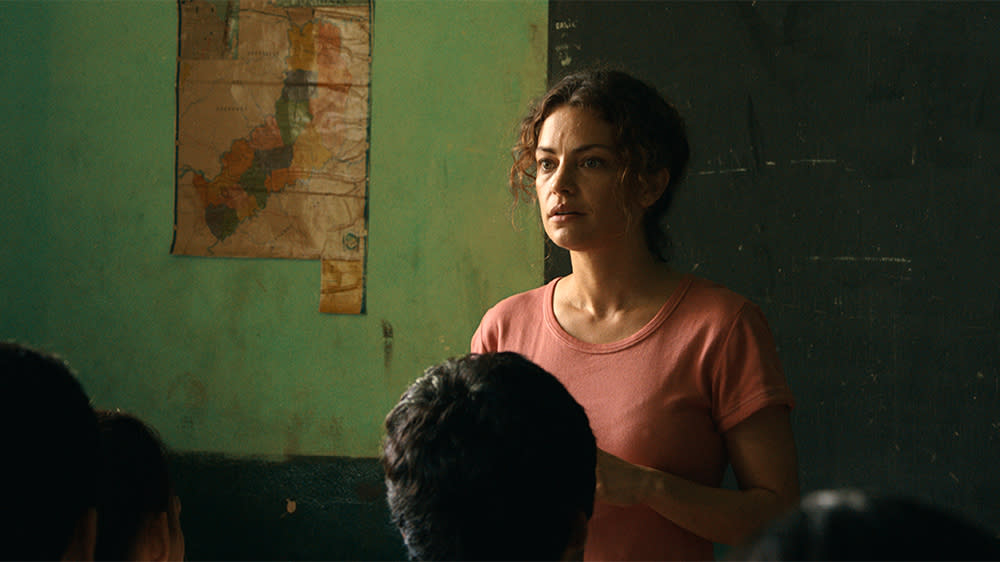Cannes Film Review: ‘Paulina’

A lawyer turned schoolteacher pursues her ideals to an almost pathological degree in “Paulina,” a provocative if not always persuasive parable from Argentine helmer Santiago Mitre, making his second feature. A fierce performance from Dolores Fonzi, as a heroine whose actions baffle those around her, helps to hold this conversation-starter together, but viewers’ own mileage and perceptions will vary — which is clearly by design. Critical support will be necessary to carry the movie to significant arthouse exposure; the Nespresso Grand Prix in Critics’ Week is a good start on getting the word out.
Less arid than Mitre’s 2011 feature directing debut, “The Student,” which used a story of university politics to comment on political dealmaking in Argentina, “Paulina,” inspired by the 1960 film “La Patota,” is likewise at once allegorical and concrete. The film opens, in what appears to be a pressure-cooker of a single take, with Paulina (Fonzi) and her father, a judge (Oscar Martinez), arguing over what he calls her “romantic hippy fantasy” living in a remote village near the Paraguay-Brazil border, where she will teach an impoverished (and in some cases indigenous) population. She sees the job as a chance to make a difference in people’s lives in a way that her father’s legal work does not. He sees her as taking a position far below her qualifications as a lawyer close to completing her Ph.D.
Paulina goes through with move, and right from the start — in school scenes that recall Laurent Cantet’s “The Class” — she fails to understand her new environment, a rural, dirt-road village. Teaching a workshop on politics and rights, she attempts to illustrate a point by explaining that she, as a employee of the state, works for the students, and not the other way around. “I’m here to teach,” she says. “If you want to go, that’s your loss.” This invitation, naturally, inspires most of the rowdy class to leave. When the group attempts to draw up rules for the class, it’s pointed out that it’s not a true democracy if Paulina gets to set the terms of the vote.
After introducing a colleague confidante (Laura Lopez Moyano), “Paulina” takes a quick rewind to provide a back story for Ciro (Cristian Salguero), a sawmill worker who’s still seething over a rejection from Vivi (Veronica Llinas). Mistaking Paulina for Vivi from a distance at night, he and an entourage of four students from the school attack her on her motorbike, and Ciro rapes her. (The way the sequence is shot and edited is needlessly murky on whether they’ve realized the mistaken identity.) Mitre doesn’t flinch from portraying the assault or its aftermath, a regimen of humiliating questions, medical exams and antiretroviral drugs.
But Paulina, who didn’t see her attackers, won’t let her recovery deter her from teaching. She goes back to school with a lesson on the Universal Declaration of Human Rights, even as she starts to suspect that some of her own students may have been responsible for the crime. Her staunch commitment to her ideals begins to strain credulity when she realizes that she is pregnant from the rape and decides to have the child, to the bewilderment of many. It’s here that “Paulina” begins to lose plausibility on the more naturalistic terms it’s set out for itself, trapped by its own conceit.
Mitre shoots in an uninflected, stripped-down style similar to that of Pablo Trapero (for whom he’s worked as a screenwriter), requiring close attention. The narrative’s jumps back and forth in time, relayed with minimal signposting, seem more like a failure to find a linear way to convey information than any sort of purposeful stylistic device. (Much of the story is told in flashback from Paulina’s formal account of the crime.)
According to a director’s note, Mitre was interested in substituting political convictions for the original’s religious dimensions. It’s the sort of conflation that the Dardenne brothers pulled off in “Lorna’s Silence,” but here the results are less convincing. Paulina would rather understand her attackers than punish them: “When the poor are involved,” she says, the justice system “doesn’t want truth, just the guilty.” (Indeed, the movie acknowledges police brutality.) Paulina’s single-minded martyr tendencies will push many viewers’ identification closer to her father, who rails against her “incomprehensible crusade.” That ambiguity makes for a pointed intellectual exercise even as it plays like a dramaturgical flaw.
The tech credits are subtly rigorous, but the night scenes can be too dark for clarity — likely an intentional, if frustrating, choice.
Related stories
Cannes: RioFilme Announces 2015 Funding
Cannes Film Review: 'The Little Prince'
Cannes: Brazilian Film Commission Network Takes Market Bow
Get more from Variety and Variety411: Follow us on Twitter, Facebook, Newsletter
